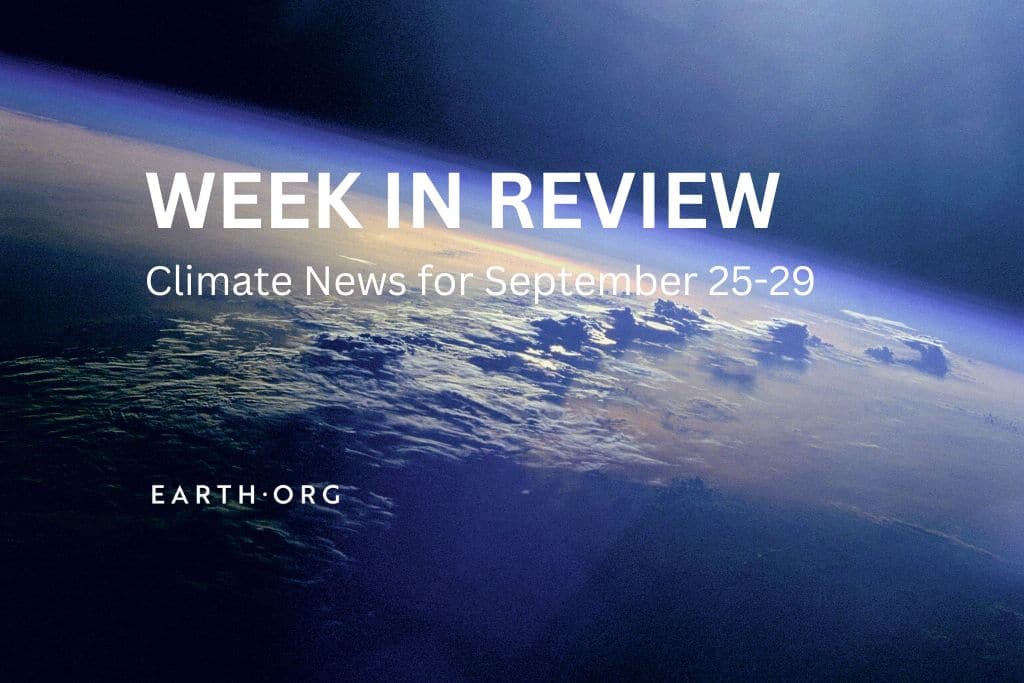This weekly round-up brings you key climate news from the past seven days, including the start of a landmark climate suit in Europe and worrisome findings about carbon offset projects and Antarctica’s rapidly shrinking ice.
—
1. One-Quarter of Carbon Offset Projects Globally Deemed Unsuitable for CO2 Reduction, Study Finds
The carbon credit market was hit by new allegations of false CO2 reduction claims as researchers found that about a quarter of global carbon offset projects are prone to greenwashing.
The new study by UC Berkley Carbon Trading Project, supported by Carbon Market Watch and published earlier this month, looked into rainforest carbon credits certified by Verra. The non-profit organisation operates standards in environmental and social markets, including the world’s leading carbon crediting standard. Also known as Reducing Emissions from Deforestation and Forest Degradation (REDD+), these projects provide financial support to governments, organisations, communities, and individuals for activities aimed at preserving forests – primarily tropical ones in the Global South – and the enhancement of forest carbon stocks.
Over the last two decades, REDD+ projects have received more than US$3 billion in aid and have generated nearly half a billion carbon credits. Some of the world’s largest polluting companies have based their climate statements on REDD+ projects, including Delta Airlines as well as oil giants Shell and Eni.
Read more here.
2. Portugal’s Gen-Z Sues 32 Governments in Largest Climate Trial to Be Heard by Europe’s Top Human Rights Court
Six young Portuguese climate activists aged 11-24 have taken all EU member states along with five other governments to Europe’s top human rights court for failing to address anthropogenic climate change.
The case – the largest climate case to be filed at the European Court of Human Rights (ECHR) – could result in legally binding consequences and groundbreaking reforms for the governments involved, which are accused of neglecting climate change and failing to cut planet-warming greenhouse gas emissions as required by the Paris Agreement, which set a target of limiting global warming to 1.5C.
The case follows a recent, groundbreaking climate trial that took place in the US state of Montana, which saw 16 young residents, aged 5-22, accusing state officials of violating their constitutional right to a healthy environment. Their victory set an important precedent as it proved that young people anywhere in the world can hold their governments accountable through legal action.
Read more here.
3. ‘Staggering’ Clean Energy Growth Is Keeping Path to Limit Global Warming to 1.5C Open, IEA Chief Says
Despite unprecedented progress in clean energy development in recent years, substantial additional efforts are still required by 2030 to reach net zero emissions by mid-century, a new report suggested.
In its latest update of the Net Zero Roadmap, the International Energy Agency (IEA) said a tripling of global renewable capacity, a doubling of energy-efficient infrastructure, a significant boost in heat pump sales, and further widespread adoption of electric vehicles (EVs) are still required.
The Agency also said that the costs of cutting methane emissions from the energy sector by 75% by 2030, a move seen as “essential”, would be equivalent to just 2% of the net income received by the oil and gas industries last year, making it “one of the least cost opportunities to limit global warming in the near term.”
Despite praising the extraordinary growth in some clean energy technologies, the IEA also criticises increased investments in fossil fuels and “stubbornly high” emissions, saying there is no room for this in a net zero scenario.
Read more here.
4. Antarctic Sea Ice Sets Record Low Maximum Extent By ‘Wide Margin’, New Analysis Shows
Antarctic sea ice cover has reached its lowest maximum extent since record began in 1979, new analysis has found.
In an announcement published on Monday, the US National Snow & Ice Data Center (NSIDC) said that on September 10, Antarctic sea ice likely reached its maximum cover of 16.96 million square kilometres (6.55 million sq mi), approximately 13 days earlier than the 1981-2010 median date.
The measurement is more than one million square kilometres (approximately 398,000 sq mi) below the previous record low set in 1986 and 1.75 million square kilometres (676,000 sq mi) below the 1981-2010 average maximum extent.
Read more here.
5. One in Six Species at Risk of Extinction in the UK, State of Nature Report Warns
One in six species is at risk of being lost in the UK, a world-leading study on biodiversity in the country has found.
Over 60 researchers and conservation organisations found that wildlife in the country has declined on average by 19% since widespread monitoring began in 1970, though evidence suggests that biodiversity had already been “highly depleted” by reckless human activity, including traditional farming practices and rapid urban development on land as well as unsustainable fishing, marine development, and climate change at sea.
According to this year’s State of Nature report, which uses the latest data from biological monitoring and recording schemes to provide a benchmark for the status of wildlife in Great Britain, 54% of flowering species – including Heather and Harebell – and 59% of bryophytes – such as mosses, liverworts, and hornworts – are at risk of extinction. As for animal species, the report suggests that birds are those facing the biggest threat, with approximately 43% of all bird species at risk of disappearing in the coming decades.

















